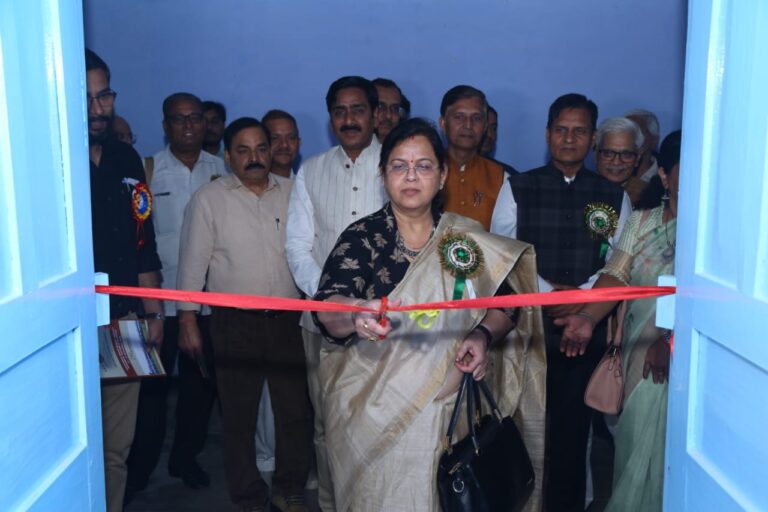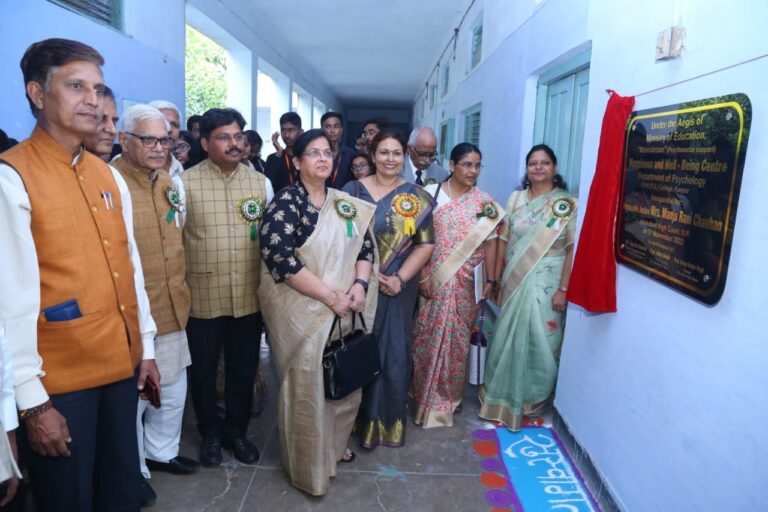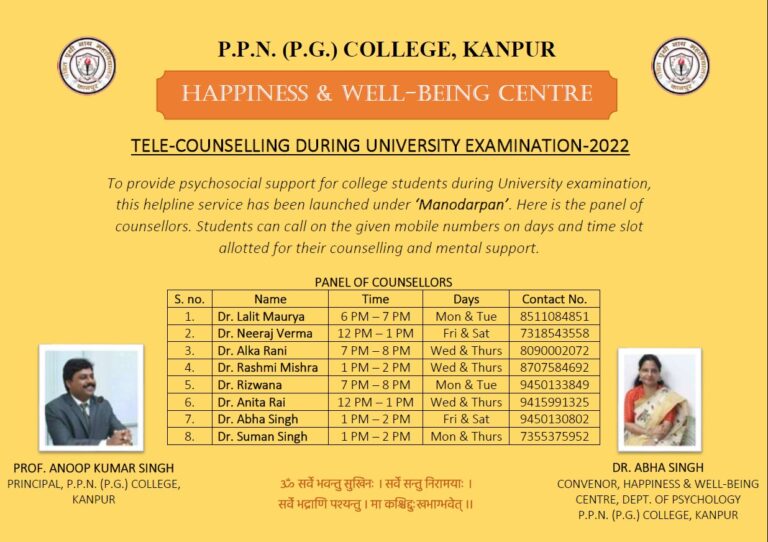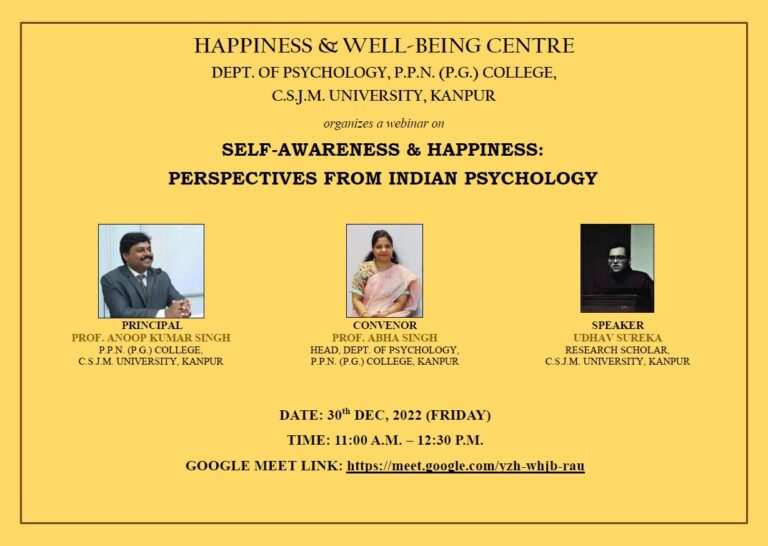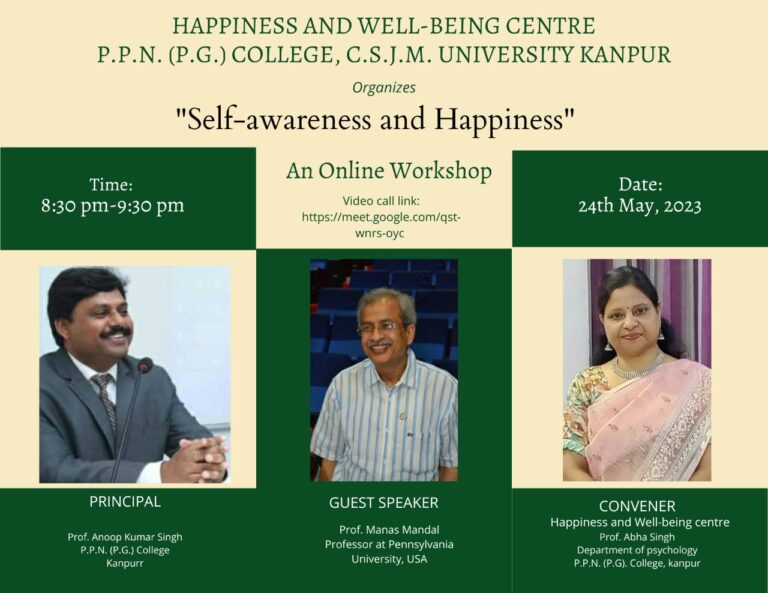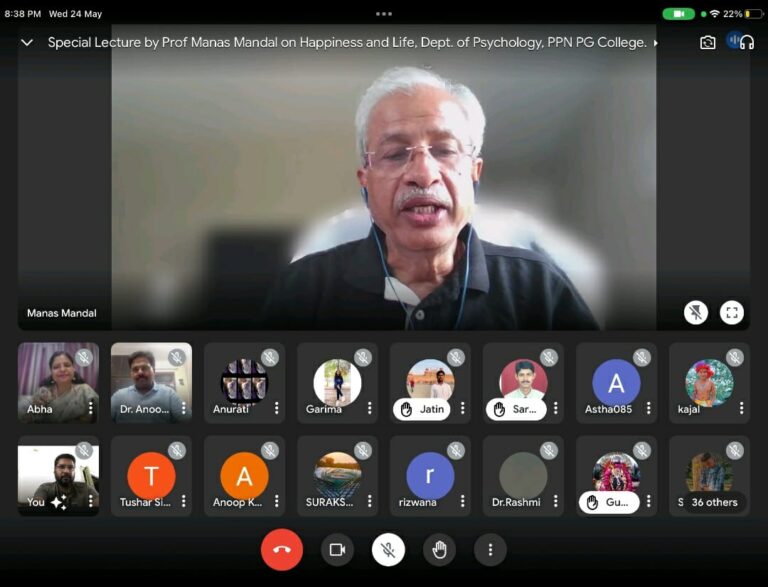Institutional Distinctiveness
Happiness and Well-Being Centre
On the 26th of January 2002, our college started a guidance and counseling cell under the guidance of the Principal, Dr. Ashok Saxena, and with the patronage of Mrs. Parminder Swarup. It was the first of its kind in the city. The counselors provided personalized sessions to students who experienced stress, anxiety, or depression. The counseling cell offered a platform for students to express their pent-up emotions, providing relief.
Moving in the direction of emotional healing, the college offered free counseling to the city during the recent pandemic by publishing the phone numbers of professors willing to provide personalized counseling. The numbers were published in leading newspapers, and many anxiety-stricken people contacted our professors.
It gives immense relief to mention that our college has withstood the pressures of the time without any loss. The emotional health of our faculty, non-teaching staff, and students has been good.
The Department of Psychology at PPN (P.G.) College, Kanpur, recently opened the Happiness and Well-Being Center, a significant development that demonstrates the college’s steadfast dedication to meeting the mental health and well-being needs of its diverse student body. Against the backdrop of today’s educational challenges and the complex web of psycho-social factors influencing students, the center stands out as a unique priority for the college and seamlessly aligns with national imperatives like MANODARPAN.
In response to this nationwide cry, PPN College’s Department of Psychology made the proactive decision to open the Happiness and Well-Being Center. This facility, designed as part of the MANODARPAN concept, addresses students’ entire development in addition to traditional academic frameworks.
The Happiness and Well-Being Center’s main goal is to make a substantial contribution to students’ overall development by actively addressing their mental health issues, fostering their emotional well-being, and teaching them values-based behavioral skills. The institution’s unique selling point is that it goes beyond the traditional emphasis on academic endeavors to acknowledge mental health as an essential element for attaining balance and higher life goals. In addition to encouraging academic brilliance, the center wants its student body to be happy and psychologically resilient.
The Happiness and Well-Being Center stands apart, in part because of its focus on long-term happiness. Although mental health services are typically linked to resolving problems and difficulties, the center adopts a proactive and optimistic stance by emphasizing long-term satisfaction. This innovative approach places the university at the forefront of emphasizing the general well-being and psychological resilience of its student body, in line with worldwide trends in positive psychology and well-being research.
The Happiness and Well-Being Center’s opening event, held during the National Seminar supported by the Indian Council of Social Science Research (ICSSR), gave the organization’s dedication to this unique priority an extra degree of legitimacy and respect. The importance of this initiative was highlighted by the presence of notable guests, such as Professor Girishwar Mishra, former Vice-Chancellor Professor Mahatma Gandhi Antrashtriy Hindi Vishwavidyalay, Wardha, Maharashtra, and honorable Justice Prayagraj. These notable individuals’ enthusiastic participation in the inaugural ceremony was a potent symbol of the institution’s commitment to the welfare of its pupils. Their involvement not only improved the Happiness and Well-Being Center’s standing but also demonstrated the group’s dedication to placing a high priority on happiness and mental health.
The institution’s commitment to this unique sector was reinforced by its partnership with prominent specialists and researchers, including Professor Diwakar Singh Rajpoot from Sagar University in Madhya Pradesh and Professor Abha Singh. Such well-known individuals’ attendance not only gave the center’s projects more legitimacy, but they also contributed insightful knowledge and experience that improved the efficiency of its well-being and mental health services.
Furthermore, the leadership of Principal Professor Anoop Kumar Singh and the enthusiastic participation of the esteemed Shivendra Swarup and the institution’s management further strengthened the dedication to this unique field. Their active participation in the inauguration event and their obvious support demonstrated the institutional backing for the center’s objective, highlighting a team-based and all-encompassing strategy to enhance student well-being.
Apart from the dignitaries and management, the presence of distinguished visitors at the opening served to underscore the importance of this endeavor. The institution’s commitment to this unique field was reinforced by the presence of Professor Diwakar Singh.
In addition to commemorating the actual opening of the Happiness and Well-Being Center, the inauguration ceremony represented a symbolic dedication to the general welfare of the student body. The cooperative endeavors of diverse stakeholders, such as distinguished visitors, organizational executives, and staff, demonstrated the shared resolve to give mental health and well-being top priority within the institution’s curriculum.
In addition, offering counseling services at the height of the COVID-19 pandemic demonstrated the center’s flexibility and reactivity to extraordinary events. Students now face novel and distinct issues because of the global epidemic, such as uncertainty, loneliness, and safety and health worries. The school showed compassion and a student-centered approach by addressing the emotional toll of the epidemic on kids by providing counseling services during this crucial time.
Working together with the MANODARPAN program further demonstrates the institution’s dedication to leading the way in offering complete support to its student body, particularly in times of crisis. The Happiness and Well-Being Center’s proactive role in providing counseling services during the COVID-19 pandemic and test season demonstrates the institution’s commitment to supporting students’ mental health and emotional fortitude.
One thing that sets the Happiness and Well-Being Center apart is its dedication to long-term happiness. The center takes a proactive and optimistic stance by placing a higher priority on long-term enjoyment, whereas mental health services typically concentrate on addressing problems and challenges. This progressive approach fits with worldwide developments in positive psychology and well-being studies, establishing the college as a pioneer in emphasizing not only academic success but also the general well-being and psychological fortitude of its students.
